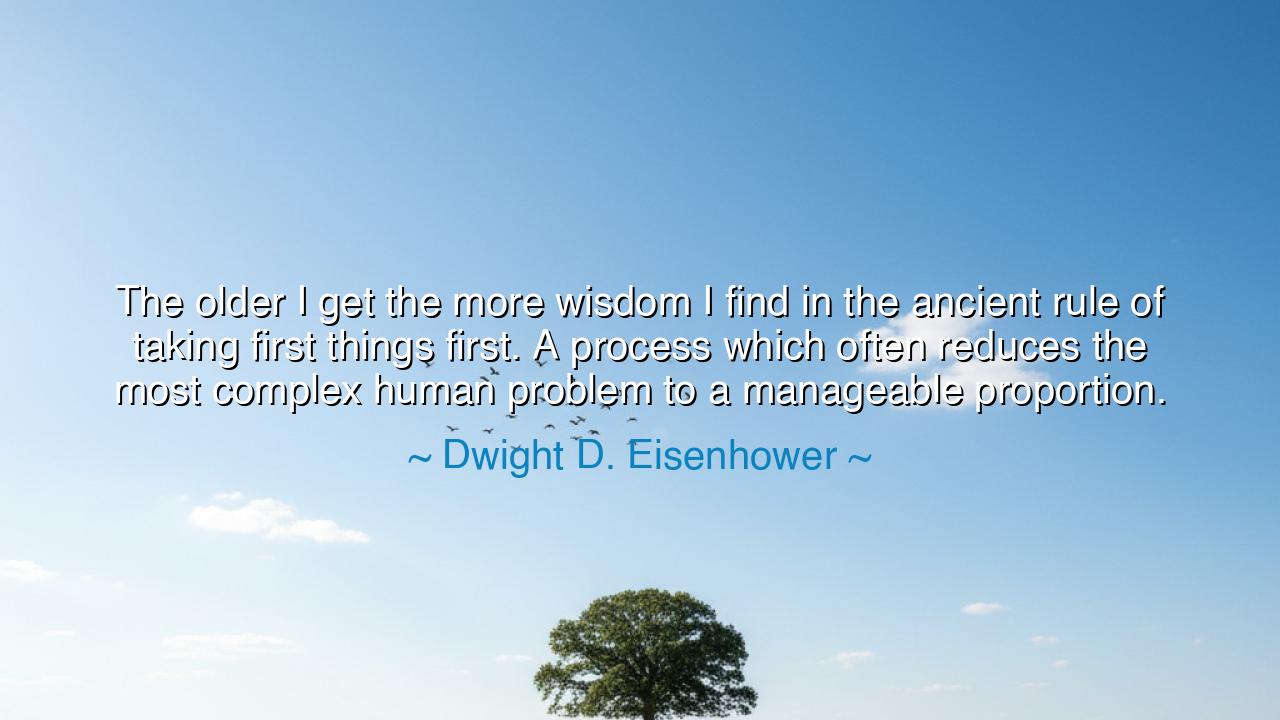
The older I get the more wisdom I find in the ancient rule of
The older I get the more wisdom I find in the ancient rule of taking first things first. A process which often reduces the most complex human problem to a manageable proportion.






In these solemn words of Dwight D. Eisenhower, we hear not the cold voice of strategy alone, but the seasoned heart of one who has walked through trial and triumph. “The older I get the more wisdom I find in the ancient rule of taking first things first.” He speaks here as the ancients spoke, reminding us that chaos yields not to haste, nor to pride, but to order born of patience. The human spirit, when seized by the storm of endless burdens, is lifted again when it learns to grasp the first things—those most urgent, most essential—and to leave the lesser until their time.
It is a counsel against despair. Many look upon the vast mountain of their problems and falter, overwhelmed by its seeming height. But Eisenhower teaches that even the mightiest summit is conquered one step at a time. By bringing the mind to focus on what must be done first, by breaking the whole into parts, the impossible dissolves into the manageable. This is no idle trick, but an art as ancient as the builders of pyramids, as enduring as the march of Roman legions.
Recall the great day of D-Day, when Eisenhower himself bore the weight of liberation on his shoulders. The invasion of Normandy was not won by contemplating the vast terror of war in its entirety. Instead, the general and his men broke the storm into stages: secure the beach, advance inland, seize the towns, free the nations. Each first thing accomplished led to the next, until the impossible dream of victory stood at last as a reality. Thus his wisdom was not theory, but the very path by which tyranny was overthrown.
And yet, his teaching is not only for generals and kings, but for every soul who struggles beneath the burdens of life. A father overwhelmed by duty, a mother surrounded by needs, a student crushed by study—all may find relief in this ancient rule. First things first—begin with what is essential, and the rest shall fall into its place. The tangled knot of existence loosens when we draw one strand at a time.
O children of tomorrow, take this counsel as a lamp for your own journey. Do not let fear of the whole paralyze you, nor let the complexity of your trials rob you of courage. Lift your eyes, seize the first task, and trust that step by step, the road will carry you through. For the wisdom of the ancients, confirmed by the trials of Eisenhower himself, is this: even the greatest human burdens may be borne when broken into manageable proportions.






Vvominhthien00@gmail.com
This perspective makes me reflect on my own tendency to procrastinate or overcomplicate problems. Focusing on the first things first seems simple in theory but challenging in practice. How does one determine what truly deserves priority when faced with competing pressures? Could adopting this mindset change not just problem-solving but also life satisfaction, by making daunting challenges feel less intimidating? I’d love to explore ways to apply this wisdom consistently in everyday life.
KNKien Nguyen
Eisenhower’s quote highlights the timeless value of structured thinking. I’m intrigued by how this principle intersects with modern productivity methods, like agile planning or time-blocking. Does taking first things first naturally lead to better outcomes, or is it more about mental clarity and reduced anxiety? I’m also curious whether this approach works differently for collaborative versus individual decision-making, and how leaders can teach teams to apply this principle effectively.
VNvy Nguyen
I like the idea that complex human problems can be made manageable by focusing on the first things first. But it raises a question: how do we deal with situations where every element feels critical? Is prioritization itself a skill that requires constant refinement? And could relying too heavily on this principle ever cause us to overlook important details or emergent factors that don’t appear at the beginning but are crucial later?
HKNguyen Huynh Khoi
This quote prompts reflection on the importance of prioritization. I wonder if Eisenhower’s method could be taught systematically, or if it comes only with experience and maturity. How do younger professionals or students learn to identify the ‘first things’ in their own work and life? It also makes me think about the psychological relief that can come from simplifying complex problems—does starting with the first thing reduce stress, or just create momentum toward solving larger issues?
KMtran khoi my
I find this quote resonates deeply with time management and decision-making philosophies. It seems that breaking down complexity into manageable steps is a cornerstone of wisdom. But I’m curious—does this approach risk oversimplifying problems that might need a holistic perspective? How do we balance taking things one step at a time with keeping the broader picture in mind, especially when multiple priorities seem equally urgent?